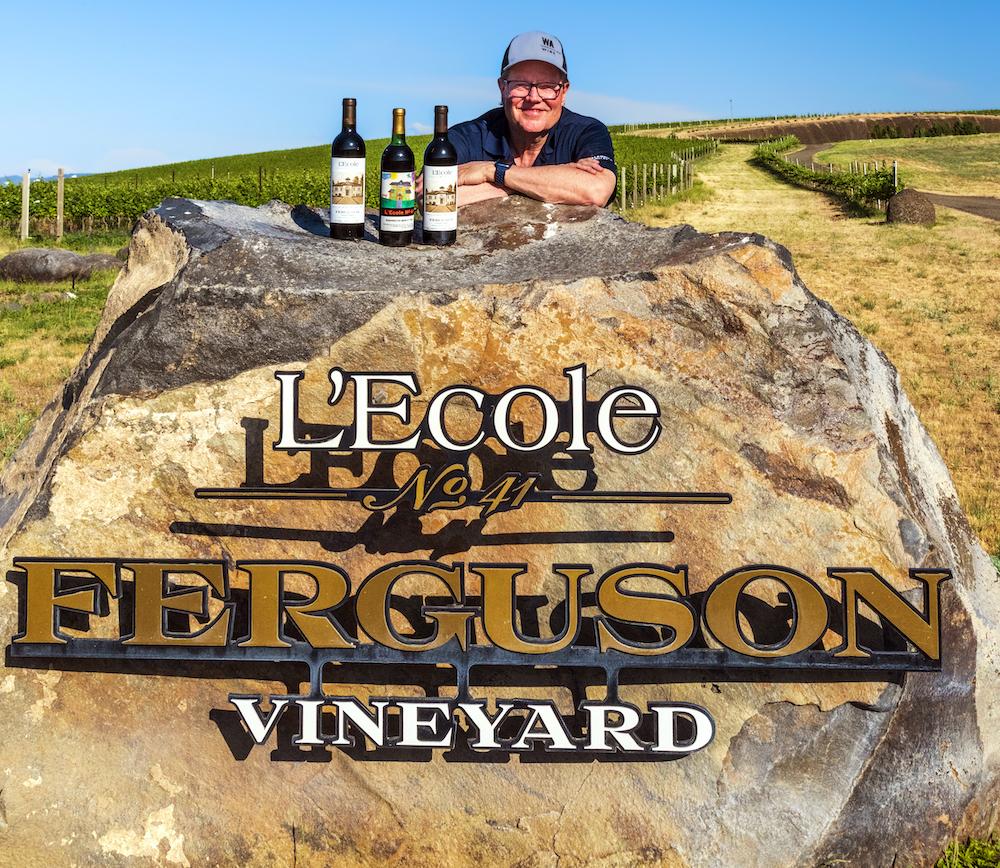
LOWDEN, Wash. — Forty years ago, L’Ecole N° 41 first rang the bell as a winery in the historic Frenchtown schoolhouse where Jean Ferguson made the wine for her husband, Baker, to take to market.
They teamed up to produce one white wine — a Sémillon — and a single red wine. That 1983 Merlot would go to the head of the class at the Enological Society of the Pacific Northwest wine competition in 1986. Their daughter Megan, and son-in-law, a young Texan named Marty Clubb, took time off from their careers in the Bay Area and helped with punchdowns on that Merlot. The brand was named after the French word for school.
“Jean was a pioneer,” Marty says. “We were the third winery in the valley, and she was the first woman winemaker in Walla Walla — and the only one for quite some time.”
Sidebar: A library tasting features Jean Ferguson’s 1983 Merlot
Sidebar: Ryan Pennington leaves Ste. Michelle to become L’Ecole COO
Acclaim: Marty Clubb to receive Award of Distinction from Auction of Washington Wines
Biography: Washington state’s HistoryLink.org project profiles Martin “Marty” Clubb
Today, the third generation is involved, and Marcus Rafanelli, schooled at Walla Walla Community College’s acclaimed wine program, prepares for his fourth vintage as the winemaker. And there is Clubb, whose stewardship and vision as managing winemaker and viticulturist continues to elevate L’Ecole N° 41. Not only does the brand remain among the pantheon of Walla Walla Valley wine producers, but it also continues to make its mark globally in competitions and the marketplace, especially with Bordeaux varieties white and red.
“We like to say we’re ‘old school,’ and you can see why in how we make our wine,” Clubb says, “but we’re also ʽnew school’ in that Marcus is not only a graduate of the enology and viticulture program but went on to become an instructor. And our entire winemaking team are all graduates of the enology and viticulture program, so they are very wine-smart — smarter than me, quite frankly, although I have more experience.”
Banking family bet on future of Washington wine
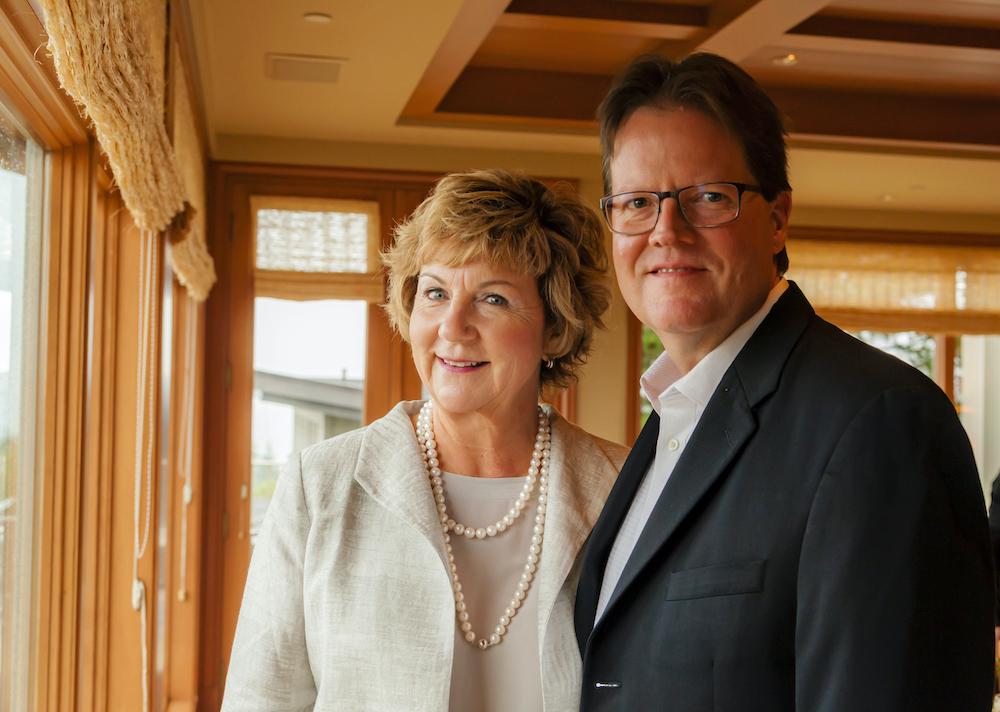
What the Fergusons launched in 1983 grew into a 50,000-case brand recognized for wines that deliciously — and with remarkable consistency — straddle approachability and age-worthiness, regardless of the varieties involved.
“Baker focused on Sémillon and Merlot, both obscure varietals at that time for Washington, but he was super well-read and had an incredible cellar of European wines,” Clubb says. “He loved white Graves. He loved Pomerol. He also understood the climatic issues behind growing great grapes.
“He ran a bank and loaned money to farmers who were growing apples and wheat and eventually wine grapes,” Clubb continued. “He understood early on there was potential for Merlot in Washington state. Baker always did things out of the mainstream, so we made Sémillon and Merlot. When I first got involved, I wondered, ʽHow are we going to sell this stuff? Nobody knows what Sémillon and Merlot are?’ ”
The Fergusons handed Clubb the reins to their retirement project in 1989. It made sense since Marty met Megan in Boston when they were both earning business degrees at the Massachusetts Institute of Technology. Megan ultimately would take the lead on another family business in Walla Walla — storied Baker Boyer Bank, which her family established in 1869.
“I remember having Petrus many times with Baker, never realizing that it was the bottle of wine that was the pinnacle of Merlot,” Clubb says. “That was one of the many pleasures of being with him. He was well-read and loved telling the stories about the wine, the vineyards and the winemakers. I learned about wine from Baker.”
A defining experience in Clubb’s life poured out when the Fergusons visited him and Megan in Boston. Baker made his way to a cheesemonger and a bottle shop that featured one of his favorites — a Beaulieu Vineyard Georges de Latour Private Reserve Cabernet Sauvignon from the Napa Valley.
“It was an eye-opening experience for me,” Clubb says. “I didn’t realize wine could be so good.”
L’Ecole achieves acclaim at overseas competitions
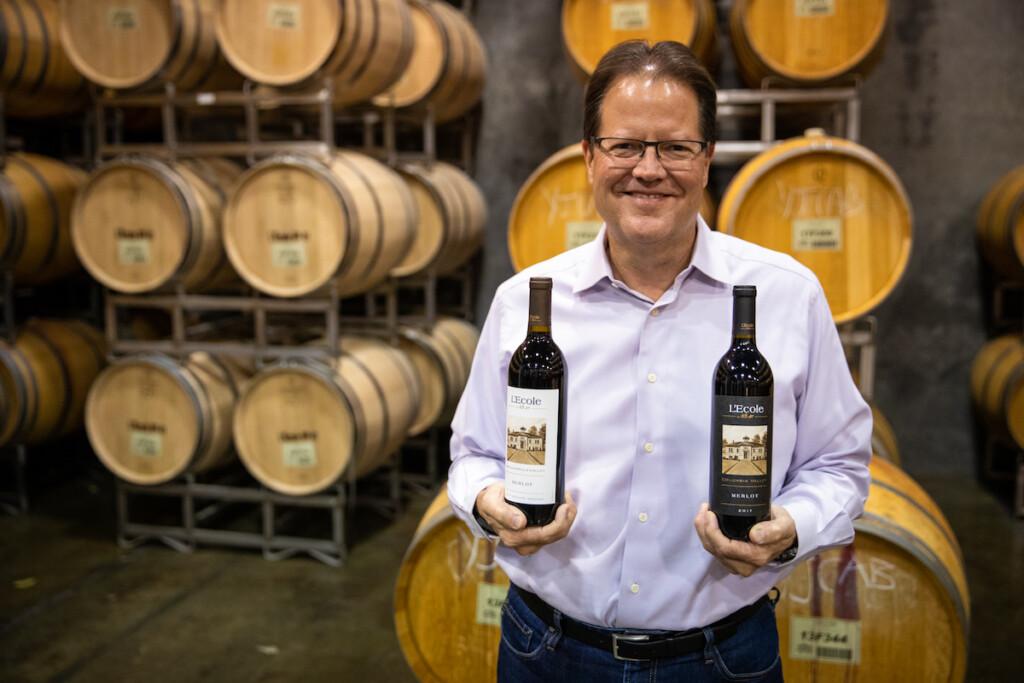
In the view of critics, the press and blind judgings, Clubb and L’Ecole have produced world-class wines for much of the winery’s history.
The most famous example came in 2014 when the 2011 Ferguson Vineyard Red Wine was voted the best Bordeaux blend in the world at the prestigious Decanter World Wine Awards in London, a judging overseen by the late Steven Spurrier — the gentleman behind the monumental Judgment of Paris. What would have made it even sweeter would have been to share the news with Jean and Baker, who died in 1998 and 2005, respectively. The planting of Ferguson’s 42 acres didn’t begin until 2008.
“We knew if we got a medal with this wine it would put us on a pathway,” Clubb says. “We were really excited that we won a gold medal. We didn’t consider that it would win an international trophy. All I could think of was beating Napa.”
Two years later, the 2013 Ferguson was awarded Best New World Bordeaux Blend at the prestigious Six Nations Wine Challenge — an invitation-only judging in Sydney, Australia. Each year, Wine & Spirits Magazine generates its Top 100 Wineries of the World. L’Ecole has made that list 16 times, which brings with it the right to pour at Top 100 Tastings in San Francisco and New York City.
Last year, it was the 2019 Perigee and 2019 Ferguson that were presented. Rafanelli created those blends, continuing the tradition of longtime winemaker Mike Sharon.
Premier sites key to foundation for L’Ecole
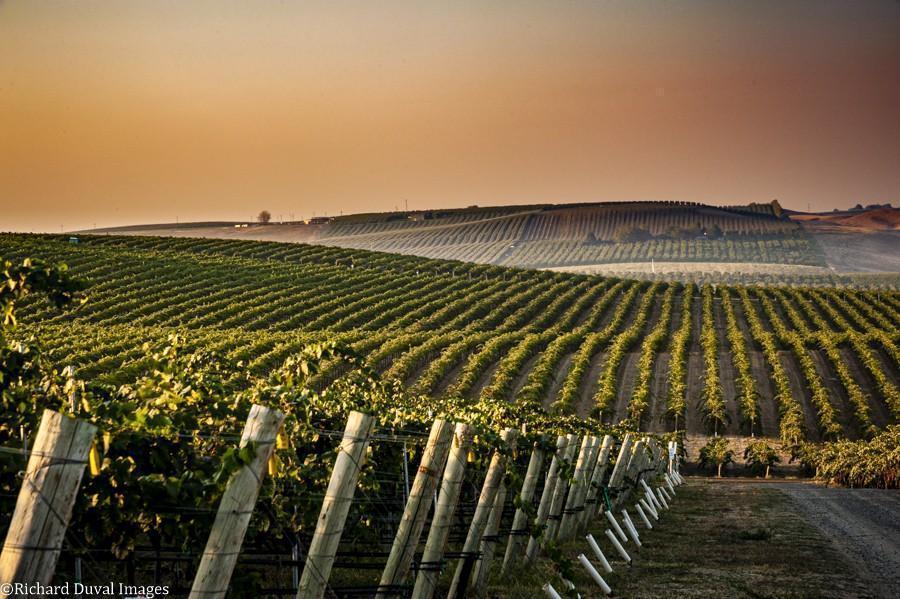
It starts in the vineyards, where Clubb partners with a number of the Columbia Valley’s premier growers, including Sagemoor (White Bluffs), Klipsun (Red Mountain), Evergreen (Ancient Lakes), Stillwater Creek (Royal Slope), StoneTree (Wahluke Slope) and Yakima Valley sites Upland, Willard and Phil Church.
In the Walla Walla Valley, the enduring connection with Pepper Bridge Vineyard and owner Norm McKibben led to L’Ecole joining the partnership in the North Slope Management, Seven Hills Vineyard and the Clubb family’s establishment of Ferguson.
“It seemed like we should have something more lasting to honor our founders,” Clubb says. “Naturally, we started thinking about planting an estate vineyard named Ferguson. This vineyard site is on the same windy ridge line as Seven Hills but is much higher in elevation — almost to 1,500 feet — and planted on an outcropping of fractured basalt, defining factors for our wines.
“Ferguson is viewed by the wine world as one of the first high-elevation vineyards planted in basalt. And Sadie Drury, who manages Seven Hills and Ferguson, is incredible. Working with her over the past 10 years has improved our quality.”
Clubb’s chemical engineering degree from Texas A&M also helps explain his drive to innovate and sidestep disaster. The Walla Walla Valley is grappling with a number of diseases and pests prevalent in other areas of the Pacific Northwest, particularly locales with own-rooted vines amid climate change.
“There is leafroll virus in Cabernet, and we’ve now discovered phylloxera in vineyards, but we’re on the front-end of the curve in dealing with this,” Clubb says. “We’ve already replanted 15 acres of Ferguson on (phylloxera-resistant) rootstock.
“We are really excited now to be a part of that world where rootstock is part of what we do,” he continued. “Planting different clones on different rootstock and expanding the versatility of the wines we’re making will help take us to the next level.”
One of the rare steps away from tradition was Clubb’s decision to redesign the brand, staying with the schoolhouse theme but moving away from the child’s drawing that served as the whimsical label for two decades.
“In the beginning we were a small, regional startup winery doing our best to be known and loved. A lot of our customer base loved that label and its identity,” Clubb says. “Our package today might speak of where we have evolved into being a national and international brand, trying to make the best wines possible from Walla Walla and Washington state.”
Clubb’s leadership extends beyond his own winery
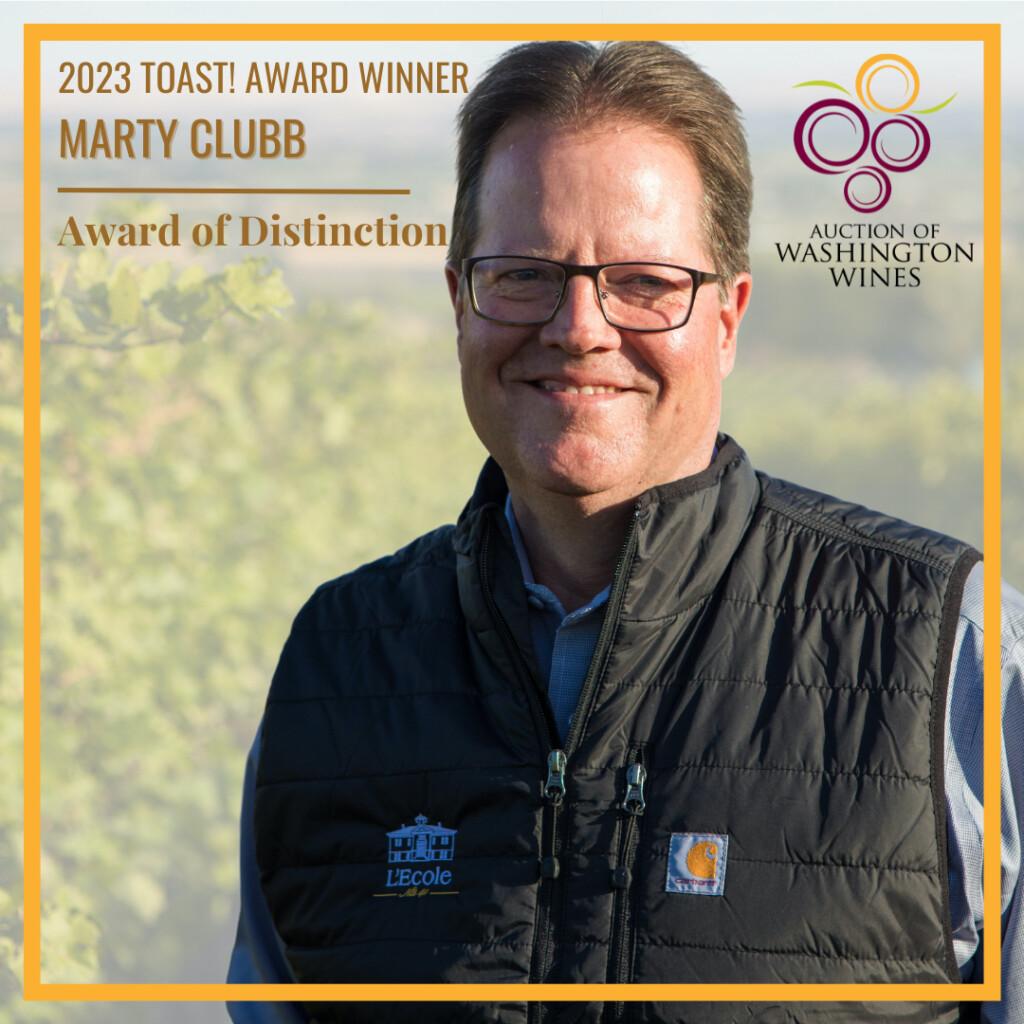
Clubb’s willingness to serve both the industry and his community keeps him engaged regionally, nationally and globally. Earlier this year, his family flew to Sacramento, Calif., to see a surprise ceremony where he was presented with the Rich Smith Award of Excellence for Distinguished Service from WineAmerica, the National Grape Research Alliance and the Winegrape Growers of America. He’s the first in the Pacific Northwest to receive the honor.
Clubb served as chair of WineAmerica and chair of the Washington Wine Institute, the industry’s state advocacy organization. He’s been on the board of the Washington State Wine Commission. He helped found the marketing group known as the Walla Walla Valley Wine Alliance and worked with other area leaders to develop The Institute of Enology and Viticulture for Walla Walla CC, where he remains on the advisory board.
“We were the third winery in the valley, and there were no grapes grown in Walla Walla,” Clubb says. “Today, there are over 130 wineries and 3,500 to 4,000 acres of vineyards. It has been a transformation in a positive way. We have so many great winemakers in the Walla Walla Valley, and there’s a lot of camaraderie and passion. We pat one another on the back when someone gets a big score. That has driven Walla Walla’s success and Washington’s success.”
A decade ago, Marty and Megan were honored as co-chairs of the Auction of Washington Wines.
’20 vintage marks Rafanelli’s return to schoolhouse
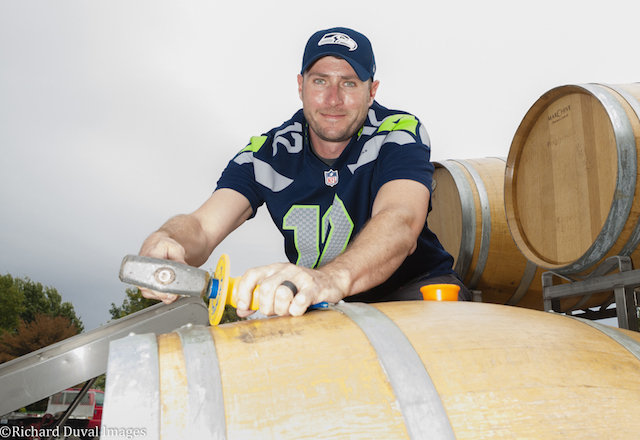
Rafanelli’s style began to emerge as a winemaking student of Walla Walla CC. After graduating, he moved to Woodinville, where he made award-winning wines for William Church and earned a reputation for his Viognier, Malbec and red blends. Exploration took him to wineries in Australia’s Barossa Valley and Dr. Loosen in Germany.
Upon his return to his native state, Rafanelli joined Walla Walla CC as a winemaking instructor. His global experience, his willingness to give back to Walla Walla CC and fascination with winemaking research made Rafanelli an ideal fit for L’Ecole. Recent additions to L’Ecole’s portfolio include a small production, winery exclusive standalone Malbec.
“We brought Marcus on, and he built his team so that we’re making the best wines here at L’Ecole — and our staff here could not be stronger,” Clubb says. “It’s that team that makes us what we are.”
With the recent opening of a new section of Highway 12, Clubb was a little concerned about losing much of that traffic coming into town.
“We took a corner of the old Marcus Whitman Hotel, and we have a tasting room there that is called Heritage Wine Bar,” he said. “It’s got a little bit of a night scene, open later with by-the-glass pours and more flights of wine to try, so it’s a little bit different format.
“Last September, we opened a tasting room in Woodinville in the Schoolhouse District,” he continued. “There are some other Walla Walla wineries there, creating its own cluster. It looks pretty promising.”
Third generation helps with next chapter
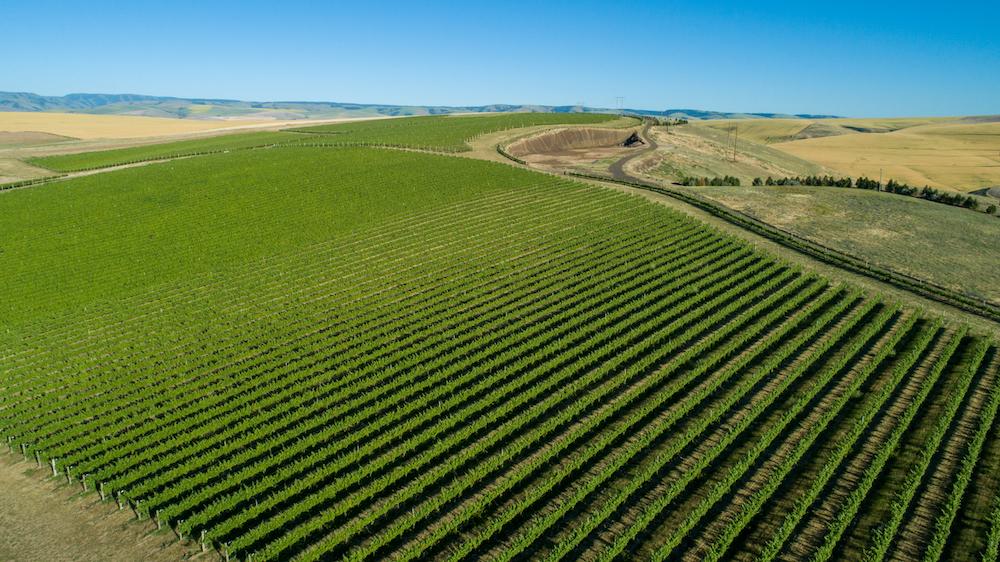
Marty and Megan’s daughter, Rebecca, designed the Heritage Wine Bar. Their daughter-in-law Melissa, who is married to their son, Riley, recently joined the team as a brand manager. Both of the children share in ownership and sit on the board of directors.
And it seems Rafanelli has found a permanent home at the former schoolhouse that taught a number of future winemakers. The list begins with Eric Rindal, who worked for the Fergusons during that 1983 harvest and started Waterbrook nearby the next year. It also includes the late Eric Dunham, who served as Clubb’s assistant winemaker prior to the launch of Dunham Cellars.
“My first experience with L’Ecole was back in 2007 when I was a harvest intern and student,” Rafanelli says. “It was a great introduction, and I kept in touch with Marty over the years. When I heard he was looking for a new winemaker I threw my hat in there so fast. My goal is to become a great Washington winemaker, and this winery gives me the capability to do that.”
Consistent acclaim comes with its challenges, including Rafanelli’s first three vintages at L’Ecole — the pandemic in 2020, the “heat dome” of 2021 and last year’s Hail Mary race to the finish.
“During COVID, there have been supply chain issues because of glass shortages, but one of the silver linings was that there were no events, so there was no travel,” Rafanelli says. “It was just me and my team, and we were able to lock ourselves in the cellar, learn the vineyard blocks, learn the varieties and learn the processes.”
New ways of managing the involvement of oxygen during the winemaking process and embracing cross-flow filtering prior to bottling also are done with the consumer in mind.
“Over the years, we thought that we needed to be racking frequently in order to be cleaning the wine up,” Clubb says. “The idea brought to us by Marcus to seal in the flavor and the aromatics of the wine — and saving those for your glass — was a whole new way of thinking for us. I see it paying off.”
From this 40-year foundation, the wines garner global acclaim in an ever-changing market. The winemaking and winegrowing teams are solid in their approach to the Heritage tier from Columbia Valley vineyards, the Walla Walla Valley lineup and special projects for club members and select longtime restaurant/ retail partners.
“I’m over the moon that Marty was open to making a few tweaks and changes to the program,” Rafanelli says. “It’s been really fun to see. It takes a while for wine to be made and then released.”
Don’t think that Clubb is standing around waiting for the recess bell to ring on him. With his cellar team in place and the recruitment of Ste. Michelle executive Ryan Pennington as COO of L’Ecole, Clubb plans to focus more on the vines and vineyard relations.
“I don’t know when we’ll get to the day when I have to retire even a little bit because thatʼs the part I love doing,” Clubb says. “It is those final few weeks of fruit maturity that makes the difference in the quality of the wine. Do we need one more thinning pass to get us there? If you are in the vineyard, you can be responsive and act on it.”
- L’Ecole N° 41 Winery, Historic 1915 Schoolhouse, 41 Lowden School Road, Lowden, WA 99360 (509) 525-0940
(There are new driving directions with the expansion of Highway 12.) - L’Ecole Heritage Wine Bar, 6 W. Rose St., Suite 103, Walla Walla, WA 99362 (509) 676-3777
- L’Ecole Woodinville, 17401 133rd Ave. NE, Suite 1010, Woodinville, WA 98072 (425) 522-5022
- Lecole.com

Leave a Reply